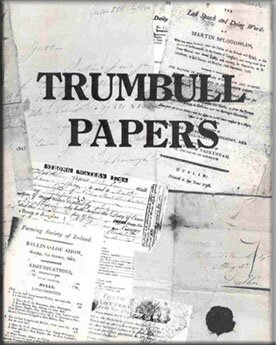Historical Archives
 |
Introduction to the Trumbull Papers by John Dillon, Regius Professor of Greek, Trinity College, Dublin, (M.A. (Oxon), Ph.D. (Berkeley) Trumbull was a prosperous tobacco merchant with business premises in Lr. Abbey Street, variously addressed as 49,86 and 149. He also dealt in wines, hops, and sugar. The papers have the apparently unique characteristic that they contain both Trumbull’s letter-books (records of his outward correspondence) and incoming correspondence, for a large part of the period. The papers at first sight looked unpromising. There are very few details available on the origins of the family. Trumbull himself was born in 1749 and seems to have inherited the business from his father. The family Bible, now in The National Library, records the birth of his grandfather, also Nathaniel, in 1687, but there is no record of the founding of the firm. Trumbull carried it on until 1814, when he handed it over to his nephew Nathaniel Anderson (his sister’s son), whom he had taken into partnership in 1811. But he drove a hard bargain with his nephew, |
|
the details of which are preserved in a bitter Chancery suit, which young Anderson brought against him in 1821, shortly before his death in 1823. Trumbull was something of a magpie. He appears to have kept everything in the way of correspondence, even quite ephemeral notes (there is one delightful one from Sir Thomas Newcomen of Killester, presenting him with a pineapple, but requesting the return of the crown). The papers cover the period from just before 1790 (when he built Beechwood) to 1823, when he died – an important thirty years in Irish and European history. Much of this history is reflected in the correspondence, all from the point of view of tobacco. In business, Trumbull dealt with a network of 373 retailers (not necessarily simultaneously) all over the country, and the correspondence with these clients gives a fascinating picture of Irish commercial life during the period 1790 – 1814. This is a period of momentous political and economic events both in Ireland and abroad. Particularly interesting, not surprisingly, are the comments of Trumbull’s correspondents in such areas as Wexford and Mayo on the events of 1798. They deplore these events, as they were bad for business, one of them lamenting, “There isn’t a shilling in Castlebar” Trumbull, himself, is unknown to history, but many of his correspondents and associates are famous – Arthur Guinness, David & Peter La Touche, Sir Thomas Newcomen, Sir Marcus & Richard Somerville – and they show the circle in which he moved, somewhat below the nobility and landed gentry, but comfortable near to the top of the business community. |